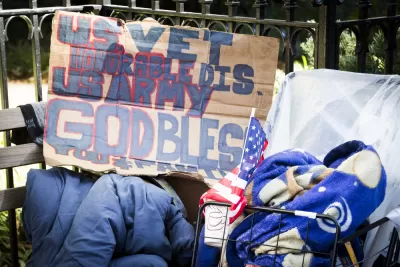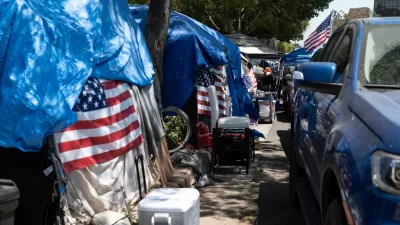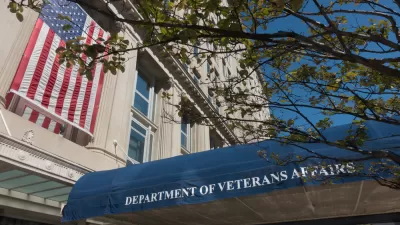The news about veteran homelessness rising in expensive cities might come as a surprise, after years of reported progress.

"National homelessness statistics…show that, after dropping nearly 50 percent, homelessness among veterans is on the rise in high-cost areas like Los Angeles, San Diego, and Seattle," according to an article by Oriya Cohen, Kimberly Burrowes, and Maya Brennan for the How Housing matters website.
Here the article sums up some of the resources and research that is shedding light on the resurgence of veterans homelessness in expensive cities:
Veterans experiencing homelessness report that barriers to housing access and housing maintenance are the primary challenges. Research has pointed to effective solutions for improving access and stability, but they all require an adequate housing supply. Rapid re-housing and other emergency financial assistance and case management programs can help veterans access housing quickly and cost-effectively. Veterans with deeper affordability or behavioral health challenges may also need rental subsidies and supportive services through programs like the US Department of Housing and Urban Development Veterans Affairs Supportive Housing. These solutions are backed by research yet face implementation challenges amid a rental affordability crisis.
The article goes into a lot more detail on the nature of the challenges facing communities working to address homelessness among veterans. A few of the big takeaways from the article include: 1) high development costs don’t reduce the importance of low-barrier supportive housing, 2) in demand-heavy markets, landlord incentives may not be enough, and 3) community collaboration leads to success.
FULL STORY: Tackling Veteran Homelessness in High-Cost Areas

Alabama: Trump Terminates Settlements for Black Communities Harmed By Raw Sewage
Trump deemed the landmark civil rights agreement “illegal DEI and environmental justice policy.”

Study: Maui’s Plan to Convert Vacation Rentals to Long-Term Housing Could Cause Nearly $1 Billion Economic Loss
The plan would reduce visitor accommodation by 25% resulting in 1,900 jobs lost.

Planetizen Federal Action Tracker
A weekly monitor of how Trump’s orders and actions are impacting planners and planning in America.

Waymo Gets Permission to Map SF’s Market Street
If allowed to operate on the traffic-restricted street, Waymo’s autonomous taxis would have a leg up over ride-hailing competitors — and counter the city’s efforts to grow bike and pedestrian on the thoroughfare.

Parklet Symposium Highlights the Success of Shared Spaces
Parklets got a boost during the Covid-19 pandemic, when the concept was translated to outdoor dining programs that offered restaurants a lifeline during the shutdown.

Federal Homelessness Agency Places Entire Staff on Leave
The U.S. Interagency Council on Homelessness is the only federal agency dedicated to preventing and ending homelessness.
Urban Design for Planners 1: Software Tools
This six-course series explores essential urban design concepts using open source software and equips planners with the tools they need to participate fully in the urban design process.
Planning for Universal Design
Learn the tools for implementing Universal Design in planning regulations.
Caltrans
Smith Gee Studio
Institute for Housing and Urban Development Studies (IHS)
City of Grandview
Harvard GSD Executive Education
Toledo-Lucas County Plan Commissions
Salt Lake City
NYU Wagner Graduate School of Public Service




























